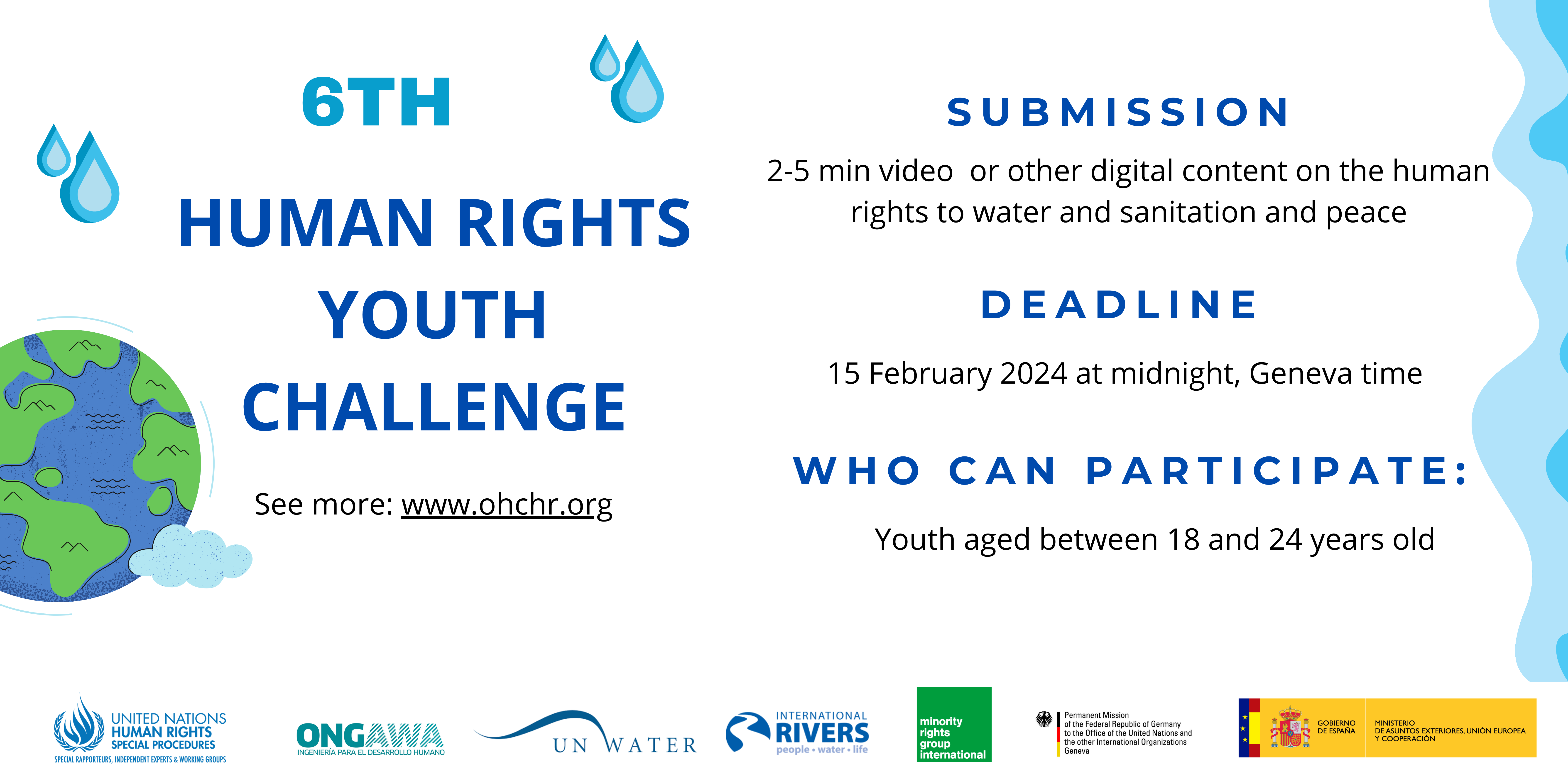Human Rights Youth Challenge
Special Rapporteur on the human rights to safe drinking water and sanitation
Sixth Human Rights Youth Challenge
On the occasion of World Toilet Day (19 November 2023), the Special Rapporteur on the human rights to safe drinking water and sanitation, Mr. Pedro Arrojo Agudo, is organizing the “6th Human Rights Challenge”, with The Permanent Mission of Spain, International Rivers, ONGAWA, Minority Groups International and UN Water
Youth aged between 18 - 24 were invited to produce and submit a video (v-log) or any other digital content on: “water as tools for peace and cooperation”.
The deadline for submission is: 15 February 2024. For more information on the challenge:
English, Français, Español
Fifth Human Rights Youth Challenge
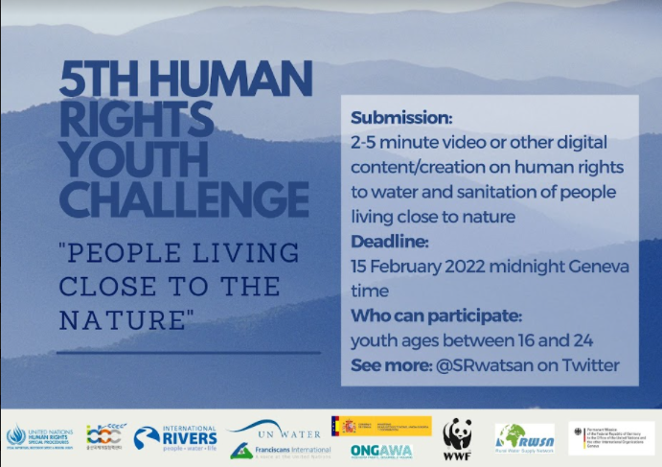
On the occasion of World Toilet Day (19 November 2021), the Special Rapporteur on the human rights to safe drinking water and sanitation, Mr. Pedro Arrojo Agudo, has organized the Fifth Human Rights Youth Challenge together with the Permanent Mission of Spain, the Permanent Mission of Germany, UN-Water, Franciscans International, International Rivers, Rural Water Supply Network (RWSN), World Wide Fund for Nature (WWF), Ulsan International Development Cooperation Center (UIDCC) and ONGAWA.
Youth aged between 16 - 24 were invited to produce and submit a video (v-log) or any other digital content on: “the human rights to water and sanitation of peoples living close to the nature" including, but not limited to, indigenous peoples, peasants, farmers, fisherfolks, hunters and gatherers, livestock rearers, and traders.
The deadline for submission was: 15 February 2022. For more information on the challenge:
English, Français, Español.
The winner of the 5th Human Rights Youth Challenge is Aminta Permpoonwiwat
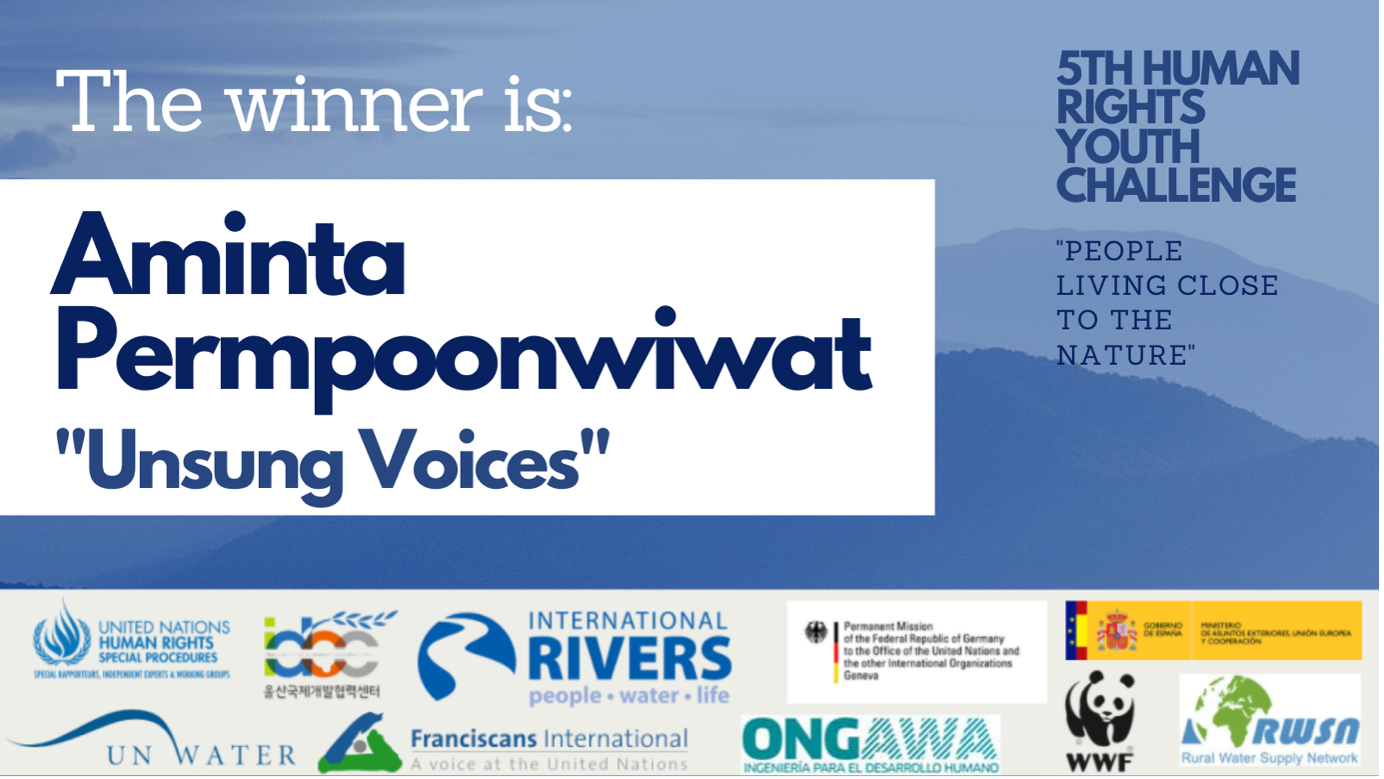
Her video, “Unsung Voices” uses the background of increasing drought, floods and water contamination in Southeast Asia to expose the marginalization of indigenous peoples and their access to safe drinking water and sanitation. It presents the disparity in access to clean water between urban areas and rural areas, but also within communities living close to the nature: noting that women and girls and community-members living in situations of marginalization often bear the consequences of inadequate access to water.
Congratulations to Aminta, who had also featured in the Special Mentions for the previous Human Rights Youth Challenge, on the impacts of climate change on the human rights to safe drinking water and sanitation.
Special Mentions
21 submissions were received to the 5th Human Rights Youth Challenge. The videos were marked on five criteria: “Understanding of the human rights to water and sanitation”, “Reliance on facts, and accuracy of statements”, “Effectiveness of communication”, “Focus on the topic: the human rights to water and sanitation of people living close to the nature”, and “Use of examples”. The criteria were marked with partnership with organizing partners, to produce a shortlist of 5 top submissions, from which the Special Rapporteur selected the winner.
The Special Rapporteur would like to specifically congratulate the following candidates for their excellent entries to the challenge:
María Belén Rivas: “Los desafíos de las mujeres y niñas sin acceso al agua”
This video focuses specifically on the case of women and girls who live close to the nature in Nicaragua. Using case studies and expert voices, it explores how inadequate access to water in rural areas exacerbates gender inequalities, notably through the time taken to fetch water. It adds how climate change and deforestation is changing local hydrology to multiply these threats to the human rights to safe drinking water and sanitation of women and girls in the region.
Antika Goyal: “Bleak truth of the unknown”
This video explores the injustice at the heart of the issue: that those who live closest to nature are also those who face the greatest threats to their human rights to safe drinking water and sanitation. Looking at the case of Taksaal in Himachal Pradesh, India, the video tells the story of children and girls waking miles to fetch water for their families. It includes local voices who explain the cascading consequences of inadequate access to safe drinking water.
Christabel Mhiribida: “The human rights to water and sanitation of people living close to the nature”
This thoroughly-researched video explores the ways in which the human rights to safe drinking water and sanitation of people living close to the nature face specific problems in rural areas, notably through the impacts of agricultural and mining industries. Going into detail about cases of water contamination and water shortages in rural Zimbabwe, the video exposes the different actors that shape access to water and sanitation for those who live there.
Akem Yvette Fonyuy: “A voice to the voiceless”
This video examines the challenges to the human rights to safe drinking water and sanitation in mile 16 Bolifamba, the Southwest region of Cameroon, where a recent cholera outbreak was recorded. It focuses on the ways in which local actors can be empowered to reclaim their rights to water and sanitation through restoring their relationship with the land and nature of their area.
Fourth Human Rights Youth Challenge
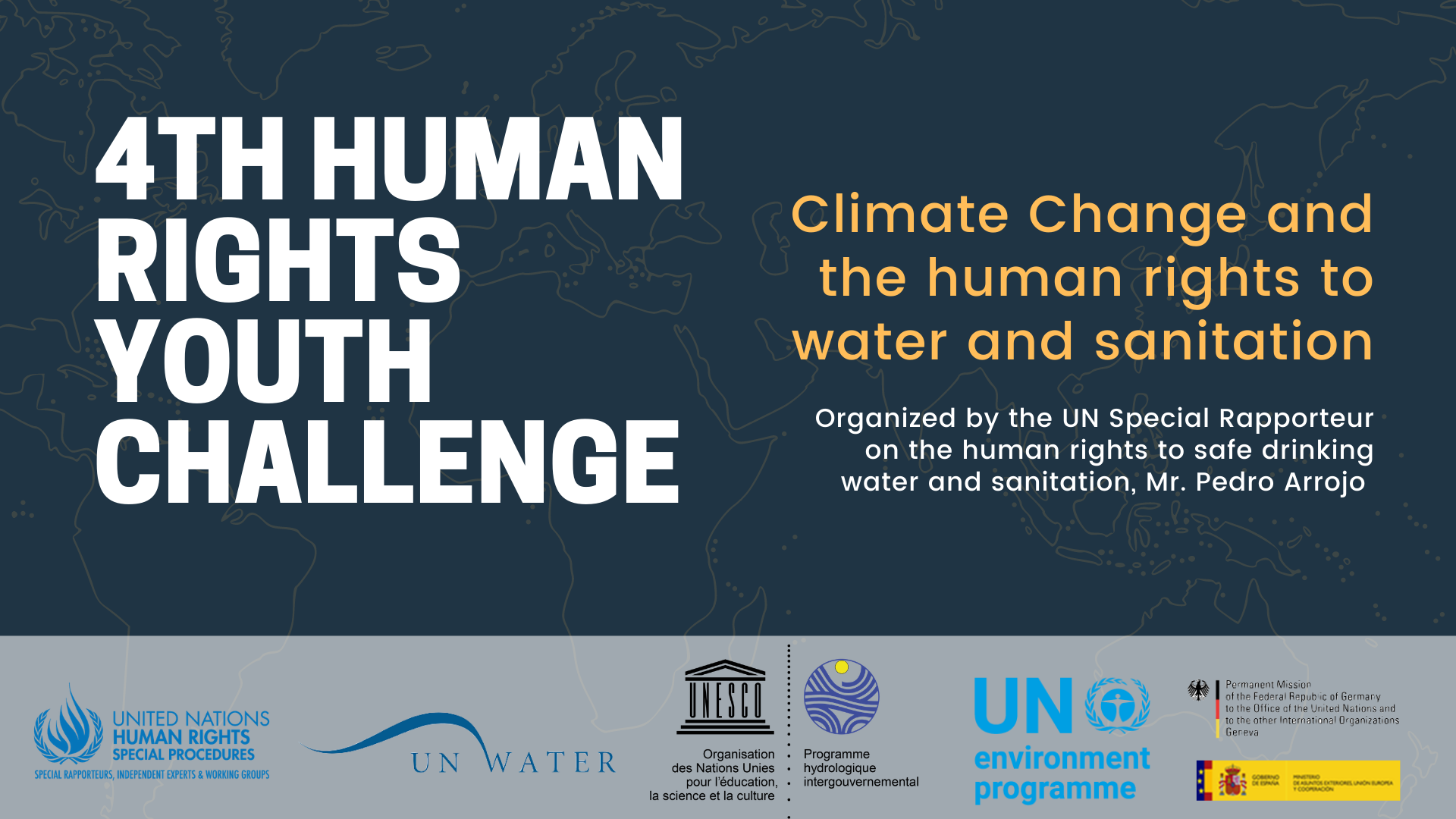
On the occasion of World Water Day (22 March 2021), the Special Rapporteur on the human rights to safe drinking water and sanitation, Mr. Pedro Arrojo Agudo, has organized a Fourth Human Rights Youth Challenge together with the Permanent Mission of Spain, the Permanent Mission of Germany, UN-Water, UNEP, UNESCO-IHP and the Special Rapporteur on environment and the human rights, Mr. David Boyd.
Youth aged between 16 - 24 were invited to produce and submit a 2-3 minute video on the "impact of climate change on the human rights to safe drinking water and sanitation".
The deadline for submission was: 31 May 2021. For more information on the challenge:
English, Français, Español
The winner of the 4th Human Rights Youth Challenge was Carmo dos Santos Sousa.
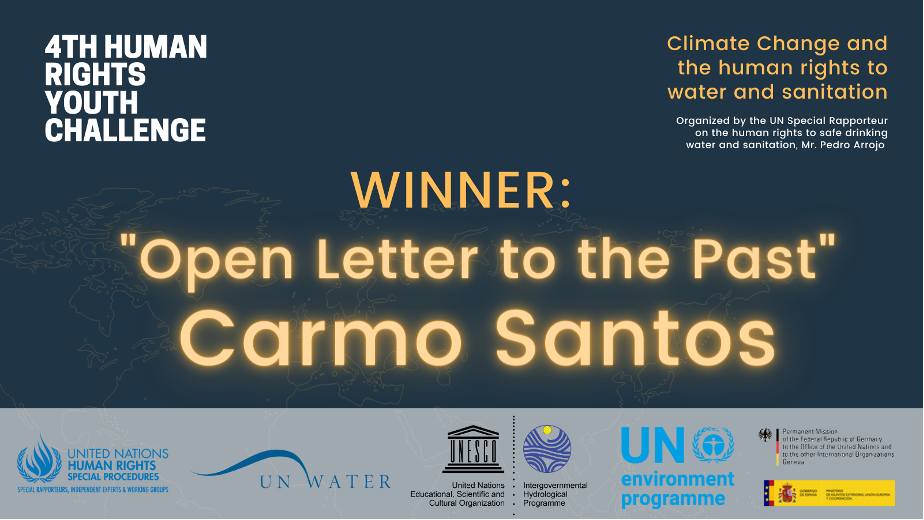
His video, ‘Open Letter to the Past’, imagines a not-so-distant future where climate change severely limits access to water around the world. His character in the video demands to know why action was not taken before it was too late, and why the vulnerable persons generation have to bear the consequences of inaction.
Special Mentions
67 submissions were received before the deadline of the 4th Human Rights Youth Challenge. 32 of these were disqualified due to being incomplete. A further 17 were disqualified for being of topic. The remaining videos were marked on five criteria: “Understanding of the human rights to water and sanitation”, “Reliance on facts, and accuracy of statements”, “Effectiveness of communication”, “Understanding of the impact of climate change on the human rights to water and sanitation”, and “Use of examples”.
The Special Rapporteur would like to specifically congratulate the following candidates for their excellent entries to the challenge:
Aminta Permpoonwiwat: “Recipe for Extinction in 4 minutes 48 seconds”
In her entry, Aminta tells a story of climate change and water scarcity from the perspective of a young person in Thailand. She outlines the impacts of climate change on access to water, in a world where rights are increasingly treated as privileges, and calls fellow youth to action.
Adityaraj Patodia: “THE MIRAGE: Water and Sanitation Rights Compromised”
This entry clearly explores the specific human rights implications of climate change, illustrating a theoretical approach with a compelling example of the climate crisis’ impact on access to water and sanitation.
Sana Khair: “Impact of Climate change on Human rights to water and sanitation”
This excellently-communicated entry uses a series of interviews with local actors in India to illustrate the urgency and depth of the climate crisis, urging youth and decision-makers to take action.
Katura Padma Priya: “CLIMATE CHANGE AND HUMAN RIGHTS TO WATER AND SANITATION”
Personal responsibility, and the importance of daily individual action, frame this well-spoken exploration of the actions worsening the climate crisis and their impact on water and sanitation access for all.
Christopher Gerale: “Climate Change and the Human Rights to Water and Sanitation”
This video is a well-documented account of the impacts of climate change on water, including climate disasters and slow-onset events.
Georgina Mukwirimba: “Climate change and water in Chitungwiza”
This is a comprehensive case study of access to water in a satellite town of Harara, Zimbabwe, providing insight into the role of water governance in protecting the human rights to water and sanitation in a changing climate.
Third Human Rights Youth Challenge
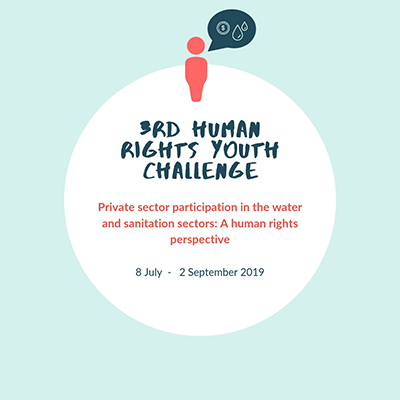
The Special Rapporteur on the human rights to safe drinking water and sanitation has organized the Third Human Rights Youth Challenge and invited young people aged between 18 to 23 to create an original submission and young people aged between 24 and 32 to submit a 2000 word essay on “privatization and the human rights to water and sanitation”.
The deadline of the submission was 30 April 2020. See more information on the challenge: English, Français, Español.
From a total of 43 submissions received, 10 essays were disqualified as they did not focus on the topic of private actors and privatization. 33 qualified submissions were anonymized and organizations that co-sponsored the Youth Challenge were invited to assess the anonymized submissions according to two criteria: “understanding of the impact of private sector participation on the human rights to water and sanitation” and on “detail and uniqueness of the case study”. Additionally, the Special Rapporteur assessed the submissions according to two additional criteria: “understanding of the human rights to water and sanitation”, and “ability to write clearly and concisely”. The four criteria were used to select four top winners.
The winners are:
- Jennifer Barr (US): “Whose clean India is it? Private sector and the human rights of sanitation workers”
- Dylan O’Donoghue (US): “Forced labour and water and sanitation as part of employment conditions in Vietnam, Indonesia, and the Philippines”
- Yushi Yamada (Japan): “Suggestion for improving the human rights to water and sanitation through private sector participation in water services (Concession scheme in Hamamatsu City)”
- Arthur Nielsen C. Demain (Philippines): “Multi-sectoral Analysis of the Joint Venture Model under PPP to Enhance Domestic Private Sector Participation in Solving the Water and Sanitation Crisis in Metro Manila, Philippines”
Second Human Rights Youth Challenge
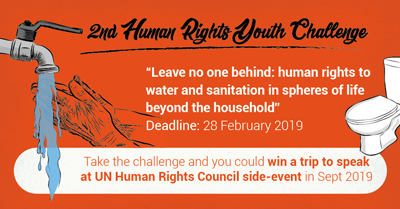
On the occasion of World Water Day in 2019 and following the success of the first Human Rights Youth Challenge in 2018, the Special Rapporteur on the human rights to safe drinking water and sanitation organized a second online challenge to raise awareness of the human right safe drinking water and sanitation. The Second Human Rights Youth Challenge was organized together with the Permanent Mission of Spain, the Permanent Mission of Germany, UN-Water, UNESCO-IHP, and OHCHR.
The theme of the challenge for the Second Human Rights Youth Challenge was ‘Leave no one behind’, which was the theme of the 2019 World Water Day. The goal of the challenge was to draw attention to people who lack of access to safe drinking water and sanitation in spheres of life beyond the household.
Amongst over 80 submissions received, the Special Rapporteur looked for submissions that demonstrated a good understanding of the human rights to water and sanitation, particularly focusing on those who are left behind in sphere of life beyond household such as public spaces.
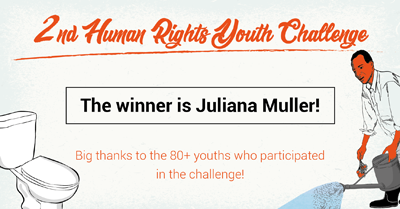
The winner of the Second Human Youth Challenge is Ms. Juliana Muller.
Her excellent video, "RIGHTLESS" allows you to walk a mile in the shoes of a young girl in rural Brazil who understands the consequences of being left behind first hand. Her creative, virtual reality-inspired submission centres on the human experiences that highlights the importance of the human right to safe drinking water and sanitation. She demonstrates an excellent understanding of rights, and a sensitivity for personal stories and experiences that are at the core of human rights advocacy. Congratulations, Juliana!
See her submission: https://t.co/NM6XYuRbYK
Special Mentions:
Over 80 young people took the time to submit their projects to the contest. The Special Rapporteur would like to thank each young person that has participated and shown their interest in the human rights to water and sanitation. To showcase the variety of talent and to express gratitude for the effort put in by all participants, the Special Rapporteur would like to share (in no particular order) a few submissions.
Each of these projects is commendable in its creativity and its demonstration of awareness of the human rights to safe drinking water and sanitation, and, most particularly, its attention to the stories of those who are left behind.
Millena Viana: https://bit.ly/2YhJ23p
In her video, Millena draws attention to the lack of access to safe drinking water and sanitation of prisoners. She visits the Prison Unit in her home city to explore how they and their rights are left behind.
Karla Galvan Llerena: https://bit.ly/2TUsMaf
In order to raise awareness of the human rights to safe drinking water and sanitation, and to inspire people to ‘MAKE THE CHANGE’, Karla goes out into the streets to interview people who are left behind in public spaces.
Mikaely da Silva Sousa: https://bit.ly/2umAOJF
This video, "Direitos Humanos e acesso a Água & Saneamento", describes the problems of access to safe drinking water and sanitation in Brazil, and examines the issues faced by Brazilians in different public spaces.
Dinh Thuy Nga: https://bit.ly/2HIWfwx
A series of beautiful illustrations of people who find their rights to safe drinking water and sanitation violated: children, prisoners, street vendors, the homeless and outdoor workers.
Teresa Paredes: https://bit.ly/2JtEWSn
Teresa identifies and explains the barriers to access to water and sanitation in her community in Peru, particularly highlighting the situation of the people who were relocated following the Tambo de Mora Earthquake in 2007.
Jorge Carrión: https://bit.ly/2U3SrfO
In his video, ‘Two Sides of a Coin’, Jorge exposes the different experiences of those who do, and do not have access to water and sanitation. He interviews people in the streets and visits communities with limited access, to draw attention to the lack of awareness of the situation of entire communities who find their rights to safe drinking water and sanitation compromised.
Wesley Nascimento: https://bit.ly/2TptAyA
Wesley’s well-researched video discusses in depth the issues around the rights to safe drinking water and sanitation of homeless people in Brazil, including some thought-provoking testimony.
Dandara Sebastian: https://bit.ly/2Tq8tfJ
Using an illustration and a series of photographs, this submission explores the situation of indigenous communities in the Amazon and how their rights, especially the human rights to safe drinking water and sanitation, are being threatened by public policies and land use.
Vale Rico: https://bit.ly/2TYHsnZ
In a long videographic journey of Mexico City, this video explores the inequality seen in urban public spaces, and the human rights to safe drinking water and sanitation can be threatened or ignored in cities around the world.
